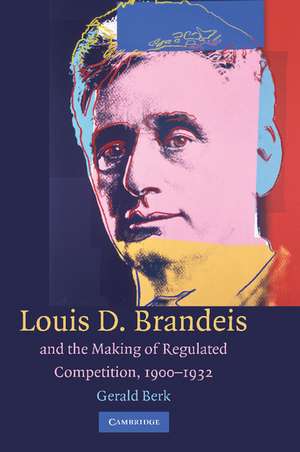Louis D. Brandeis and the Making of Regulated Competition, 1900–1932
Autor Gerald Berken Limba Engleză Paperback – 18 iul 2012
| Toate formatele și edițiile | Preț | Express |
|---|---|---|
| Paperback (1) | 287.07 lei 6-8 săpt. | |
| Cambridge University Press – 18 iul 2012 | 287.07 lei 6-8 săpt. | |
| Hardback (1) | 752.55 lei 6-8 săpt. | |
| Cambridge University Press – 21 iun 2009 | 752.55 lei 6-8 săpt. |
Preț: 287.07 lei
Nou
Puncte Express: 431
Preț estimativ în valută:
54.93€ • 58.74$ • 45.80£
54.93€ • 58.74$ • 45.80£
Carte tipărită la comandă
Livrare economică 18 aprilie-02 mai
Preluare comenzi: 021 569.72.76
Specificații
ISBN-13: 9781107405080
ISBN-10: 1107405084
Pagini: 296
Dimensiuni: 152 x 229 x 17 mm
Greutate: 0.44 kg
Editura: Cambridge University Press
Colecția Cambridge University Press
Locul publicării:New York, United States
ISBN-10: 1107405084
Pagini: 296
Dimensiuni: 152 x 229 x 17 mm
Greutate: 0.44 kg
Editura: Cambridge University Press
Colecția Cambridge University Press
Locul publicării:New York, United States
Cuprins
1. Creative syncretism; Part I. Brandies and the Theory of Regulated Competition: 2. Republican experimentalism and regulated competition; 3. Learning from railroad regulation; 4. The origins of an ambiguous Federal Trade Commission; Part II. Regulated Competition in Practice: 5. Cultivational governance at the Federal Trade Commission; 6. Deliberative polyarchy and developmental associations; 7. From collective action to collaborative learning: developmental association in commercial printing; Part III. Regulated Competition Contested: 8. The politics of accountability; Part IV. Conclusion: 9. Civic enterprise; Appendix A. Industries and number of associations with at least substantial involvement in developmental association, by industry group.
Recenzii
'Berk's nuanced study of Brandeis is about the rejection of preordained categories and rigid formulas, by extraordinary policymakers and also by social scientists who seek to understand them. Ultimately, it is about the limitless possibility of politics to reorder familiar arrangements of state and economy in the interests of a differently-conceived world. Its publication could hardly be more timely.' Karen Orren, University of California, Los Angeles
'A masterpiece of counter-factual reasoning, this book challenges the orthodoxy that markets and regulation are incompatible alternatives. Berk shows how Louis Brandeis' theory of 'regulated competition' offered the principles for a very different kind of relationship between government and economy that could have changed the course of the twentieth-century. At the juncture at which America was transforming from a market economy and a laissez-faire state to a corporate economy and a regulative state, Berk's compelling historical analysis shows that the path could have been different. This is institutional history at its best.' William Roy, University of California, Los Angeles
'Berk recovers for us an improbably prescient Brandeis: an advocate and institutional architect who helps demonstrate the feasibility of a market order of 'regulated competition' that avoids the traditional, limited choice between antipathy to all business cooperation or regulated monopoly and, instead, encourages innovation while reducing the dangers of concentration (and we might hope today – the viral diffusion of catastrophic behaviors) through a Federally sponsored exchange of best practices and cost benchmarks within and across industry groups. This is history the way and when we need it.' Charles Sabel, Columbia Law School
'Civic Enterprise raises to a new level the distinctive strength of Gerry Berk's work: his capacity to radically alter our understanding of classic issues and episodes in American political development on the basis of new and original historical research inspired by current theoretical and comparative debates, while recasting and enriching the categories of those debates themselves in light of his empirical findings. This book is thus likely to attract a wide interdisciplinary audience and consolidate Berk's reputation as one of the premier scholars of American political development of his generation.' Jonathan Zeitlin, University of Wisconsin
'A masterpiece of counter-factual reasoning, this book challenges the orthodoxy that markets and regulation are incompatible alternatives. Berk shows how Louis Brandeis' theory of 'regulated competition' offered the principles for a very different kind of relationship between government and economy that could have changed the course of the twentieth-century. At the juncture at which America was transforming from a market economy and a laissez-faire state to a corporate economy and a regulative state, Berk's compelling historical analysis shows that the path could have been different. This is institutional history at its best.' William Roy, University of California, Los Angeles
'Berk recovers for us an improbably prescient Brandeis: an advocate and institutional architect who helps demonstrate the feasibility of a market order of 'regulated competition' that avoids the traditional, limited choice between antipathy to all business cooperation or regulated monopoly and, instead, encourages innovation while reducing the dangers of concentration (and we might hope today – the viral diffusion of catastrophic behaviors) through a Federally sponsored exchange of best practices and cost benchmarks within and across industry groups. This is history the way and when we need it.' Charles Sabel, Columbia Law School
'Civic Enterprise raises to a new level the distinctive strength of Gerry Berk's work: his capacity to radically alter our understanding of classic issues and episodes in American political development on the basis of new and original historical research inspired by current theoretical and comparative debates, while recasting and enriching the categories of those debates themselves in light of his empirical findings. This book is thus likely to attract a wide interdisciplinary audience and consolidate Berk's reputation as one of the premier scholars of American political development of his generation.' Jonathan Zeitlin, University of Wisconsin
Descriere
This book provides an innovative interpretation of industrialization and statebuilding in the US by tracing the development of regulated competition.


















